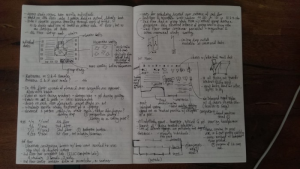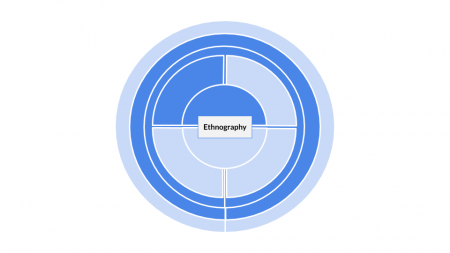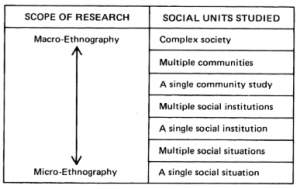Ethnography
| Method categorization | ||
|---|---|---|
| Quantitative | Qualitative | |
| Inductive | Deductive | |
| Individual | System | Global |
| Past | Present | Future |
Annotation: Ethnography is both a process and an outcome - the final written product - of qualitative research (3). This article will focus on the process, giving an overview of different kinds of ethnographic research and its correlating methods.
Background
Ethnography can be regarded one of the most important qualitative research methods that looks back on a long tradition but also many transitions. The foundations of modern Ethnography reach back about a hundred years. Until 1900, ethnographic information mostly originated from the collection of anthropological artifacts and descriptions of indigenous communities that were collected and reported by amateurs, e.g. missionaries or travellers, and subsequently evaluated by 'armchair' anthropologists. By the beginning of the 20th Century, then, anthropologists began to go into the field and get in contact with people themselves instead of relying on second-hand information (1).
An influential figure for the subsequent development of Ethnography was Bronislaw Malinowski, a Polish anthropologist who is considered to be the founder of fieldwork and participant observation methods relevant to Ethnography to this day (1, 8). He invested himself in 'classical' ethnographic work, spending months with a Melanesian community and gathering insights that he published in his 1922 work "Argonauts of the Western Pacific". He systematically recorded and later taught his approach to fieldwork, which heavily furthered the methodological foundations of anthropology (1).
The methodological approach to Ethnography was further influenced by the early 20th century work of the Chicago School of sociology, which is also responsible for major developments of interview methodology (see Open Interviews and Semi-structured Interviews). Sociologists in Chicago attempted to study individuals within the city by observing and interviewing them in their everyday lives, and furthered the methodological groundwork for the field this way (1).
Overall, Ethnography is historically and practically most closely related to the discipline of Anthropology and constitutes a defining method of this discipline (8). Still, the theoretical reflections and methodological approaches also apply to research endeavours in other Social Sciences. Today, Ethnographic research no longer focuses on investigating 'exotic' communities, but deals with a diverse range of topics, including media studies, health care, work, education, communication, gender, relations to nature, and others (7, 9).
What the method does
Ethnography is not strictly a method, but rather a "culture-studying culture" (Spradley (2), p.9). It is a scientific approach to how research should be conducted that includes a set of methods, but also a set of theoretical considerations on how to apply these methods (1). Ethnography attempts to understand the social world and actions of human beings in a specific cultural and societal surrounding of interest to the researcher (8). The researcher intends to systematically describe this culture and understand another way of life from the 'native point of view' (Spradley (2), p.3). "Rather than studying people, ethnography means learning from people." (Spradley, p.3). According to Malinowski, three aspects are of interest to the researcher: what people say they do (customs, traditions, institutions, structures); what they actually do; and typical ways of thinking and feeling associated with these elements (1). The latter may be expressed directly by the studied individuals, but may also be *tacit knowledge,* i.e. **knowledge that is inherent to the culture but taken for granted and communicated only indirectly through word and action (Spradley (2), p.5). Ethnographic research attempts to infer this knowledge by listening carefully, observing and studying the culture in detail (2, see below).
The term *culture* "(...) refers to *the acquired knowledge that people use to interpret experience and generate social behavior."* (Spradley (2), p.5). In this regard, not only 'exotic' enclosed societies such as the indigenous community studied by Malinowski are of interest in ethnographic research, but also small-scale cultures such as a classroom, a family or a restaurant (3).
Observations are often supplemented by qualitative ethnographic interviews to gain a deeper understanding into previously observed situations. These are a form of open interview that focus on how the interviewees classify and describe their experiences and positions concerning their social context. Interviews may take place in-between observations, or in dedicated, set-up interview situations, and also with groups of interviewees (1). The Interviewees may be asked about broad or specific situations. Elements that may be learned about are: people involved, places used, individual acts, groups of acts that combine into activities or routines, events, objects, goals, time and feelings (4). The ethnographic interview differs from standard open interviews in that it tries not to impose any pre-conceived notions and structures on how the interviewee might view, define or classify these elements according to his/her worldview. Instead, the questions are formulated so that the interview is almost entirely guided by the interviewee's responses (1, 5). This way, the researcher may be able to extract insight into "(...) contextual understandings, shared assumptions and common knowledge upon which a respondent's answers are based (...). Ethnographic questions are used to elicit the perceptions and knowledge that guide behavior, while discouraging individuals from translating this information into a form corresponding to the researcher's revealed understanding and language." (Johnston et al. 1995, p.57f). In such an interview, the power relation between researcher and interviewee is shifted, because the researcher does not have much that he/she wants to learn about, but the interviewee has all the information to offer that is of interest to the researcher. Therefore, a trustful relationship between the researcher and the interviewee is of special importance (4, see Normativity).
Ethnography is thus a very open and inductive process, with the researcher acting like an explorer who does not rely on strictly pre-defined questions leading his/her research, but rather goes into the field openly and develops new questions as the first results emerge from the data collected after some time (1, 3, 8). In this reflexive practice, the research design continuously evolves during the study. The research is done in a circular process, which sets ethnographic research apart from classical theory-led, linear social science approaches (3, see Figure below). The scope of the research is decreased with every circulation: In terms of the research questions, the researcher first asks rather general *descriptive* questions about the situation at hand. The data is analyzed and based on the results, the focus is narrowed down: next, *structural* questions are asked, before *contrast* questions are used in the next step to further reduce the scope of the research design. The same applies to the data collection: Initially, the observations are rather descriptive, but become more and more focused and selective as the ethnographic research continues (3)


